The technology Utah is using to track the coronavirus
As Utah becomes the first state to implement a COVID-19 tracking system for people who enter the state, questions are being asked about how the technology works, the company behind it and what is being done with personal information.
During a press conference on Friday, Joe Dougherty, Public Information Officer, for the Utah Division of Emergency Management, explained how the system “kicks in” when drivers cross over into one of the state’s entry points.
“We draw a number of shapes – we call them polygons – on a map, and then we write a 90 character message that has been sent out,” said Dougherty. “People who enter the area that has been geo-targeted, will – if it works the way it’s supposed to – will receive that alert.”
That alert will direct travelers to Entry.Utah.gov to fill out a COVID-19 declaration form, which asks if you have any symptoms of the virus.
“The whole effort here in what we’re trying to do is in fact, the ability for us to gather critical information on those who are affected by this coronavirus and to protect those who are not yet affected,” said Jess Anderson, Commissioner of Utah Department of Public Safety.
The technology being used is nothing new, but how it is now being implemented is new, according to state officials.
The technology, called WebEoc, is a system set up by the Federal Emergency Management Agency and the Federal Communications Commission, which allows critical alerts to be sent out to the public in emergency times.
“That system does not track your data at all. It uses a technology called Cell Broadcast,” Dougherty said. “With Cell Broadcast, the message goes out to cell phone towers and then cell phones that happen to enter the geo-fenced area are pinged with that alert.”
Dougherty said the system also doesn’t store any data.
“That data will be collected and given in a secure fashion to the Utah Department of Health so that they can track that and trace any movement of someone who has coronavirus in the state.”
More From KDXU 890 & 92.5









